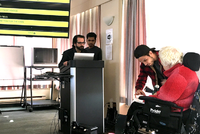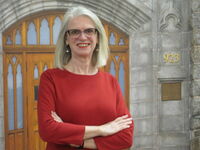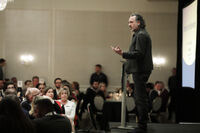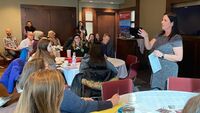By Erin Elaine Casey |
Picture a sunny auditorium filled with about 50 bright young faces. It looks like a typical university class, but these particular Computer Science students are about to embark on a very important real-world assignment: developing a customizable app to help young adults with autism navigate the complexities of email.
Today, Professor Terry Goldsmith’s Mobile App Development class welcomed Chrystal Tushaus BA’04 Coordinator of the Post-secondary Autism Support Services (PASS) program at Autism Nova Scotia. PASS offers individualized support to students with Autism Spectrum Disorder (ASD) in non-academic areas to help them successfully transition in and out of post-secondary education.
Tushaus starts by explaining some of the characteristics of people with autism, including challenges with social skills and communication, repetitive behaviour, or specific interests. “Some folks with ASD have never emailed at all, and some have a strong online presence,” explains Tushaus. “They need an app that will help them learn the art of emailing.”
The idea of the app, which will work on mobile or desktop, is to break down the process of composing and sending an email into simple steps with lots of help functions and guidance for different kinds of emails. For example, an email to your mom is going to have a different tone and style from an email to your employer or your professor. “The biggest barrier can be knowing what to write in a message,” adds Tushaus.
Together, Goldsmith’s class brainstorms and asks questions. How should the screen look? Are pop-up help boxes a good idea? What kind of language should be used? Many students are already clustered in groups of three or four around laptops, whispering their ideas. These groups will go on to develop different versions of the app to be tested in the lab by PASS students themselves.
“I haven’t done anything like this before,” says second-year Computer Science student Ulysses Nicoletatos. “It’s usually: ‘here’s an assignment, do it’, then it’s done and graded, so it’s kind of cool to actually develop something for someone to solve an issue they have.”
Mark Trickett just graduated with a Business degree and is now in his first year of Computer Science. “It means a lot to be able to do this. It’s kind of unique to a lot of other classes I’ve taken. We’re actually doing it for young adults with autism and meeting their requirements. It’s great for us and it feels good to be able to help out in any way we can, so this is special.”
That feeling is exactly what Terry Goldsmith is after. He got involved when the parent of one of his students with ASD introduced him to Tushaus. “It’s experimental this semester. I’ve given them a model they can work towards, and it’s easy to get engagement with this class.” And getting an A isn’t about doing it perfectly — it’s about working through the problem thoroughly and showing strong effort. But some groups will be standouts.
“There are always people in any given class who are better programmers than I am,” he adds, smiling. “I never get in anybody’s way.”
In fact, just the opposite. Goldsmith has been creating these hands-on learning opportunities for Saint Mary’s students since 2017. He wanted to give the students in his more advanced Software Engineering course a real-world experience. Unlike Mobile App Development, which even a first-year student can take, Software Engineering has multiple prerequisites and is a much more demanding course, requiring students to build apps completely from scratch: no models and no templates.
First, let’s back up. Not only does Terry Goldsmith have an undergraduate degree in Computer Science from Concordia and undergraduate and master’s degrees in Environmental Design from Dalhousie, he’s a certified Continuing Care Assistant, or CCA.
“For five years, I took care of my parents who were both terminally ill with cancer in succession. When I started working again after they died, I thought I’d start off as a CCA. There was funding to become a CCA, and I was just coming back to Halifax from Montreal. I felt quite strongly about providing care and wanting to do more of that. When I trained as a CCA in 2009, I really started thinking about how technology could help.”
He started working for Northwood Homecare, a relationship that would ultimately lead to the first app development projects with his software engineering students. To date, Goldsmith’s students have developed three iterations of apps to help Northwood residents with messaging, scheduling, blogging, and even keeping track of bridge games and tournaments.
Students interact directly with residents. “They talk to them to find out what they want,” says Goldsmith. “What’s different about software engineering is we’re not trying to automate anything. We’re not putting sensors anywhere or making a robot to open the door for you. Our approach is to focus on the person. The person rules. Whatever they want, they get. Whatever makes sense to them, they get. Loneliness, for example, has been shown to be just as deadly as cancer. So, for a messaging app, we might look at building them something that will help them keep in touch more easily.”
Every year has a different set of projects, and in 2018 the class won the Northwood Live More Award for Innovation. “I still have students coming back to me from last semester doing updates on the app in their free time.”
Goldsmith still keeps a toe in the continuing care world by providing one shift per week of homecare. “I don’t need it financially, but psychologically I need it because it fits in with what I’m teaching. It’s very tied to that, and perhaps students are with a resident who has a problem communicating, and I can bridge that because I have that training.”
Goldsmith visits Northwood’s Harbourview location every week to touch base with the app users. “All these apps, we’re building to achieve something, to give people more opportunity to do what they want to do. People told us they were having trouble seeing photos and opening attachments, so the systems we design are there to overcome barriers and people look forward to using them because they’re fun. What they do, they do very well.”
“It’s an all-year-round thing. My students leave, but we all stay in contact. It’s always being worked on. Just last week, I was spending time with the residents from last year’s class.”
Ben Jollymore took the Software Engineering class in the fall of 2018. He’s now a software engineer at Perennia Food and Agriculture, a provincial development agency that helps farmers, fishermen, and food processors be more prosperous and profitable.
Jollymore’s project was to develop a personal assistant software for the senior demographic to handle day to day organization and communication. He describes it as “basically Siri for seniors: I called it Ellen. It was voice-activated with a list of commands, including ‘set an alarm’ or ‘show me my notes’.” After polling residents to find out what their requirements were, Jollymore set out to make a general-purpose app any senior could use. “It was my first taste of creating user-dedicated software. It was definitely stressful. I learned so much doing the whole thing myself, instead of just one component of it.”
“The entire thing was self-directed learning,” he adds. “I had to learn what I needed to learn before I could learn it. And that’s what I have to do at work every single day now. So it got rid of that fear. There can be a big degree of impostor syndrome in software engineering. Now I’m not afraid of not knowing something. You just have to learn it, and that’s a really good thing to learn early.”
The process of not just building the app, but having the flexibility to work with people who don’t themselves know what they want, is an important part of the learning process. “It actually takes all the stress out of it, because you accept that you don’t know where you’re going,” laughs Jollymore.
Goldsmith sees multiple benefits to both his students and their clients. “They’re working with non-profit groups and marginalized communities, which is always good. It’s also giving them real world experience full of risk and problems in a safe environment, and that’s hard to come by. I’ve had students tell me ‘This course helped me get this job.’ That’s really valuable.”
It also fits perfectly with Saint Mary’s commitment to service learning. All the apps are open source and freely available on GitHub, so “anyone in the world can get it. It’s a community service.”
“It’s win-win,” says Goldsmith. “The residents comment universally on how great it is to work with young people, and how great it is to feel listened to. They say, ‘This feels so good because I’m tired of getting help all the time – I’m actually able to give something here.’”
Whether it’s making communication and recreation easier for older adults, or giving post-secondary students with ASD the opportunity for more independence, Terry Goldsmith plans to carry on for as long as the need is there.
Now, back to Goldsmith’s Mobile App Development course. Shaquille Lynch and Até-Jah Browne are classmates who both transferred from the Antigua and Barbuda International Institute of Technology. “It excites me because honest truly we have an objective to bring technology out into the real world,” says Lynch. “It also excites me to work directly with the students. It helps me to get to know them and I’m really looking forward to that.”
Browne agrees. “It’s very exciting to be able to help people in society that actually need it. And the fact that we’re going to be able to use this to better their knowledge to help them in the real world – that means a lot.”




